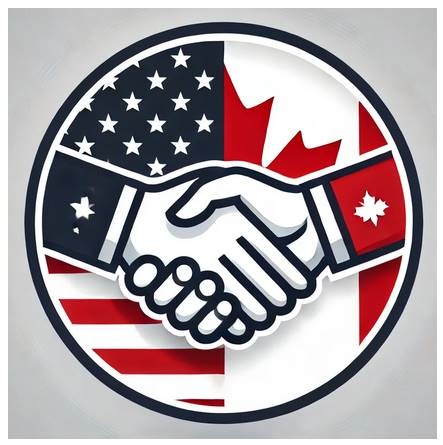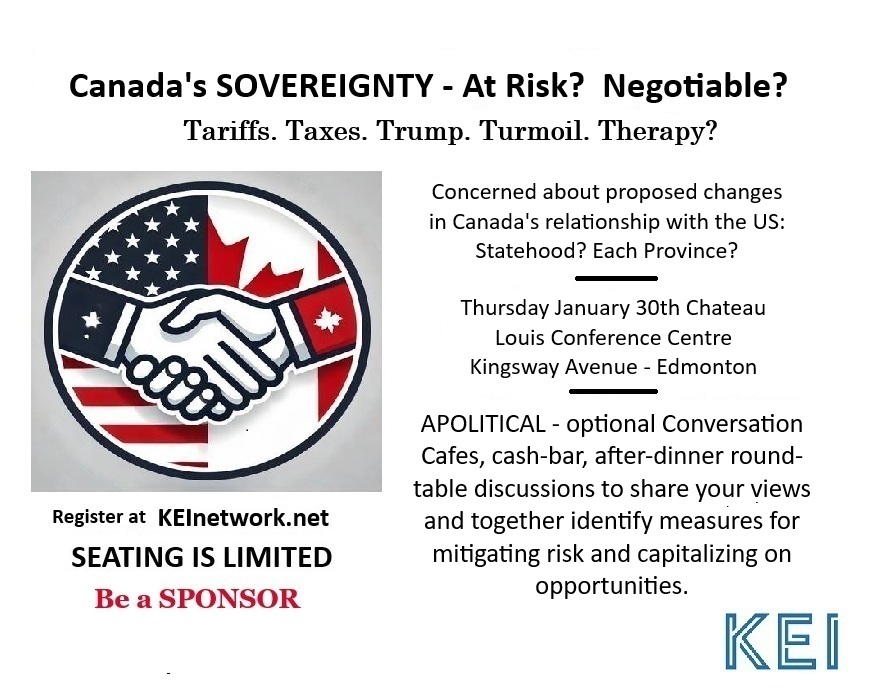|
Webinar HERE Anticipating the Impact of Fusion for Energy |
DIRECTORY - Visit KEInetwork.net |
||
|
Contributions: |
Action: Help sustain KEI's contributions |
Town Hall Meeting Sovereignty - At Risk? Negotiable? January 30th |
|
|
Note. Greg MacGillivray donated $50 with a New Year's challenge to you - the KEI Network, to meet or beat this amount! Greg also offered through Scenarios to Strategy (S2S) to donate $10 more for each donation up to a maximum of $250. |
|||
|
|
We initiated 2025 with a tongue-in-cheek overture to negotiate a change in the US:Canada relationship including a forecast of the result and a follow-on webinar addressing the threats and opportunities. Last week's webinar about the Dawning of Fusion also addressed the importance of anticipating the profound social, economic, environmental, and geopolitical impact of this emerging technology. We are launching an exploration of Canadian's views on another more immediate risk - an anticipated threat to Canadian to sovereignty, by hosting a town hall meeting on the topic January 30th in Edmonton. Join us. FOR MORE |
||
|
Good fences, better neighbours: Rethinking the Canada-U.S. relationship - How Canada can preserve its sovereignty while deepening cross-border co-operation Robert Frost famously said, “Good fences make good neighbours.” While this adage underscores the importance of respecting boundaries, it also invites reflection on the purpose of those fences and how they shape relationships. For Canada and the United States, the border symbolizes both division and a shared history—a line of sovereignty and a bridge of interdependence. At a time of significant global challenges, it’s essential to re-examine this relationship, address its strengths and vulnerabilities, and lay the groundwork for a stronger partnership. As someone deeply connected to both nations, this topic is profoundly personal. Born and raised in the U.S., I moved to Canada as a young man and eventually became a Canadian citizen. This choice reflected years of experience and admiration for Canada’s distinct identity and values. It also mirrored a recognition of the deep, sometimes fraught, interdependence between the two nations—a relationship rooted in history and shared interests yet continually tested by evolving challenges. - continued below
Canada and the United States share the longest undefended border in the world, a testament to a partnership built on trust and mutual benefit. Economically, culturally, and politically, the ties run deep. Alberta’s energy exports to the U.S., for example, fuel both economies but also reveal the risks of over-dependence on a single market. Similarly, the U.S. reliance on Canadian resources—from oil and gas to timber and wheat—highlights a reciprocal need that must be carefully managed. Yet this interdependence is not without tension. Divergent values and policy approaches often create friction. Canada takes pride in its emphasis on social welfare, multiculturalism, and collective well-being. The U.S., on the other hand, is known for its individualism, market-driven dynamism, and global assertiveness. While sometimes a source of misunderstanding, these differences also offer valuable lessons for each nation. In an increasingly interconnected world, the challenges facing Canada and the U.S. transcend borders. Environmental and economic transitions, technological disruptions, and geopolitical uncertainty demand a unified approach. For instance, given the cross-border nature of environmental impacts, the shift toward renewable energy and climate adaptation requires co-ordinated policies. Similarly, addressing technological changes, such as the regulation of artificial intelligence and securing supply chains, necessitates collaboration. However, this partnership must not come at the expense of Canada’s unique identity and sovereignty. Troubling rhetoric, like Donald Trump’s suggestion to annex Canada into a “United States of North America,” highlights the need for vigilance. While such remarks may lack immediate credibility, they remind us of the importance of preserving Canadian independence while fostering a respectful relationship.
While these issues present significant challenges, they also offer opportunities for Canada and the U.S. to strengthen their partnership through focused, collaborative policies. Moving forward, both nations must formalize and deepen their dialogue, drawing on their shared history to confront modern challenges effectively. A bilateral climate and energy council could align policies and accelerate the transition to sustainable practices. Similarly, joint task forces on emerging technologies, like artificial intelligence and cybersecurity, would foster innovation while protecting national interests. Modernizing trade agreements, like the United States-Mexico-Canada Agreement (USMCA), could address economic vulnerabilities and reflect current realities. Finally, expanding cultural exchange programs—including student exchanges and cross-border internships—would deepen grassroots connections and mutual understanding. Canada and the U.S. have always been more than neighbours—they are partners bound by geography, history, and shared destiny. However, this partnership must evolve to meet the demands of the future. By prioritizing collaboration on critical issues and respecting each other’s sovereignty, both nations can chart a course toward greater prosperity and stability. The challenges we face—environmental, technological, and geopolitical—demand co-operation, not isolation. Let’s work together not to erase our differences but to build a shared future rooted in mutual respect and purpose. Good fences may make good neighbours, but great partnerships make better futures. - Editor Also appearing HERE in |
|||
Editor@KEInetwork.net |
|||





 To maintain a strong partnership, both nations must tackle key challenges together. Addressing these issues collaboratively will build trust and mutual prosperity. Here are some critical areas that demand attention:
To maintain a strong partnership, both nations must tackle key challenges together. Addressing these issues collaboratively will build trust and mutual prosperity. Here are some critical areas that demand attention: